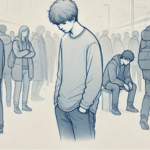Key Takeaways
- Stress-induced psychosis typically lasts from a few days to a month.
- Genetics, mental health history, and the severity of stress influence the duration.
- Early intervention with therapy and medication can significantly reduce the duration.
- Managing stress through lifestyle changes can prevent recurrence.
- A Mission For Michael (AMFM) offers specialized treatment programs such as residential, PHP, IOP, and outpatient options across California, Virginia, and Washington.
Understanding Stress-Induced Psychosis
Stress-induced psychosis is a mental health condition where an individual loses touch with reality due to extreme stress or trauma. This state can lead to hallucinations, delusions, and disorganized thinking – making it challenging for the person to distinguish what is real from what is not.
The causes of stress-induced psychosis are multifaceted. Extreme stress or traumatic events often act as the primary triggers. These could include the loss of a loved one, a significant life change, or any event that overwhelms a person’s coping mechanisms.
Symptoms and Signs
Symptoms can vary but often include:
- Hallucinations: Seeing or hearing things that aren’t there
- Delusions: Strong beliefs in things that are not true
- Disorganized speech and behavior: Incoherent speech or erratic actions
- Emotional disturbances: Intense emotions or a lack of emotional response
These symptoms can be distressing and disorienting, not only for the individual experiencing them but also for those around them.
Common Triggers
Stress-induced psychosis doesn’t happen in isolation. Certain triggers often set the stage for an episode. These include:
- Severe emotional stress: Divorce, job loss, or the death of a loved one
- Physical stress: Chronic illness or significant injury
- Sleep deprivation: Lack of adequate rest can trigger psychotic symptoms
Identifying these triggers can help in managing and preventing future episodes.
| A Mission For Michael: Expert Mental Health Care Founded in 2010, A Mission For Michael (AMFM) offers specialized mental health care across Southern California, Minnesota, and Virginia. Our accredited facilities provide residential and outpatient programs, utilizing evidence-based therapies such as CBT, DBT, and EMDR. Our dedicated team of licensed professionals ensures every client receives the best care possible, supported by accreditations from The Joint Commission and the California Department of Health Care Services. We are committed to safety and personalized treatment plans. Start your recovery journey with AMFM today! |
Duration of Stress-Induced Psychosis
Typical Time Frames
Episodes of stress-induced psychosis usually last from a few days to a month. The condition is often self-limiting, resolving as the stressor diminishes or is managed.
This timeframe can vary based on several factors, including the individual’s overall mental health and the severity of the stressor. In some cases, the symptoms may resolve spontaneously as the individual adapts to the stressor.
However, early professional treatment can help speed up recovery and provide coping strategies for future stressors.
Factors Influencing Duration
- Severity of Stressor: The more severe the stressor, the longer the psychosis may last. For instance, a traumatic event like the sudden loss of a loved one might prolong the duration.
- Individual Resilience: Personal resilience and coping mechanisms play a significant role. Individuals with strong support networks and effective coping strategies may experience shorter episodes.
- Underlying Mental Health Conditions: Those with pre-existing mental health conditions, such as depression or anxiety, might experience longer durations.
- Access to Treatment: Timely access to medical and psychological interventions can significantly shorten the duration of psychosis.
By addressing these factors, we can customize interventions to the individual’s specific needs, enhancing the chances of a quicker recovery.
Treatment and Recovery
Medical Interventions
Medical interventions can help stabilize individuals and manage symptoms effectively.
Antipsychotic medications are commonly prescribed to reduce symptoms such as hallucinations and delusions. These medications can help restore a sense of normalcy and facilitate recovery.
Besides medication, addressing any underlying medical conditions, such as sleep disorders is crucial. Treating these can help reduce the duration and severity of psychotic episodes.
Therapeutic Approaches
Therapy plays a vital role in the recovery process. Cognitive Behavioral Therapy (CBT) is particularly effective in helping individuals understand and manage their thoughts and behaviors.

Through CBT, individuals can learn to identify stressors and develop coping strategies to handle them more effectively. This approach can also help in reducing the likelihood of future episodes.
Family therapy is another valuable tool. It involves family members in the treatment process, providing education and support to create a nurturing environment for recovery.
Support Systems
A strong support system is invaluable in the recovery process. Family, friends, and community resources can provide the emotional and practical support needed to manage the challenges of stress-induced psychosis.
Creating a supportive environment aids long-term recovery and can significantly reduce the risk of recurrence.
Preventive Measures and Lifestyle Adjustments

By making certain lifestyle adjustments, individuals can reduce the risk of experiencing stress-induced psychosis.
Some ways include:
- Balanced Diet: Proper nutrition supports overall mental health and resilience.
- Regular Exercise: Physical activity can reduce stress and improve mood.
- Adequate Sleep: Ensuring sufficient rest is crucial for mental well-being.
- Mindfulness and Meditation: These practices can help calm the mind and reduce stress.
- Time Management: Organizing tasks and setting priorities can prevent overwhelm.
- Relaxation Techniques: Deep breathing and progressive muscle relaxation can alleviate tension.
Incorporating these techniques into daily life can help manage stress more effectively and prevent episodes of psychosis.
Finding Your Path to Recovery with AMFM

While stress-induced psychosis typically resolves within a few days to a month, the journey to recovery depends on several factors including the severity of stress, and access to proper treatment. At AMFM, we understand that each person’s experience with psychosis is unique, which is why our approach to treatment is personalized and comprehensive.
Our multidisciplinary team across California, Virginia, and Washington specializes in treating stress-induced psychosis with evidence-based methods that address both the immediate symptoms and underlying causes.
Through a combination of medication management, psychotherapy, and supportive counseling, we help stabilize your condition and develop effective coping strategies for managing stress.
What sets AMFM apart is our commitment to whole-person care. We don’t just treat symptoms, we work with you to build resilience and develop practical skills that prevent recurrence. Our range of treatment options, from residential programs to outpatient care, ensures you receive the right level of support for your specific needs.
Don’t let stress-induced psychosis control your life. With early intervention and proper support, full recovery is possible. Contact AMFM today for a confidential assessment and take the first step toward reclaiming your mental well-being.
Frequently Asked Questions (FAQ)
What is stress-induced psychosis?
Stress-induced psychosis is a mental health condition triggered by extreme stress or trauma, leading to symptoms such as hallucinations, delusions, and disorganized thinking.
It is a temporary condition, often resolving with the removal of the stressor and appropriate treatment. It is distinct from other psychotic disorders like schizophrenia, which are typically chronic.
Can stress-induced psychosis be prevented?
While it may not be possible to prevent all cases of stress-induced psychosis, certain measures can reduce the risk. These include managing stress effectively, maintaining a healthy lifestyle, and seeking early intervention when stress becomes overwhelming.
How is stress-induced psychosis diagnosed?
Diagnosis typically involves a comprehensive evaluation by a mental health professional. This includes a detailed history of symptoms, a physical examination, and possibly laboratory tests to rule out other causes. The professional will also assess any underlying mental health conditions that could contribute to the symptoms.
What role does medication play in recovery?
Medication can play a significant role in managing symptoms of stress-induced psychosis. Antipsychotic medications are commonly used to reduce hallucinations and delusions. These medications help stabilize the individual, making it easier to engage in therapy and other interventions.
Are some individuals more at risk for stress-induced psychosis?
Yes, certain factors can increase the risk of developing stress-induced psychosis. These include family history of mental health disorder, pre-existing mental health conditions like anxiety or depression, and exposure to high levels of stress or trauma.
What should I do if a loved one is showing signs of psychosis?
If someone you care about is exhibiting symptoms like believing untrue things, reporting hallucinations, showing disorganized thinking, withdrawing socially, or experiencing significant emotional changes, approach them with empathy and encourage professional help. Don’t directly challenge their beliefs, as these feel very real to them.
Contact a mental health professional or treatment center like A Mission For Michael (AMFM) for guidance on assessment and treatment options that can help your loved one regain stability and improve their quality of life.












